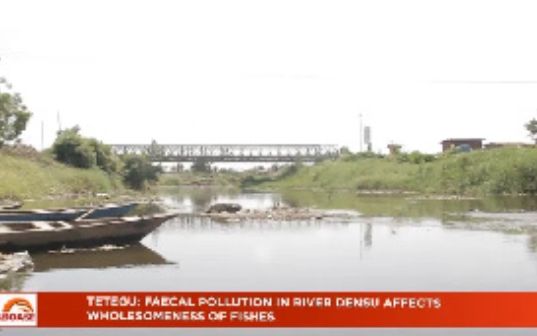GENERAL NEWS
Tetegu residents discharge faeces into River Densu

A TV XYZ painstaking investigations show that besides choked drains and filth engulfing the town, households are channelling faecal matter into the Densu river which is a source of livelihood for indigenes.
The threat is higher as most of the affected areas are flood-prone.
When XYZ reporter Piesie Okrah visited some of the communities in the area, the pollution was heavy as garbage could be seen floating freely in the river.
Tei, a fisherman who has been working on the river for years bemoaned the level of pollution in the river which he says was once a source of drinking water for the indigenes.
“Today, working on this river is not a good experience because of the level of pollution that has taking place here,” he told Piesie Okrah.
He said he and other colleagues who have been fishing in the Densu river always harvest plastics and other wastes on daily basis.
“Apart from harvesting a chunk of waste which is found in the river, the lives of the fishes in the river are threatened by the domestic activities around,” Tei indicated.
According to the water Resources Commission, there are about 18 fish species in the Densu including the Weija Reservoir. However, the most commonly fished species are Tilapia and Mud-fish.
Tei says the fishes are becoming extinct due to the heavy pollution.
“We used to catch mudfish and other species but because of the waste being thrown into the river, the fishes we catch look unhealthy,” he added. “Sometimes some of us catch fishes that have swallowed diapers and faeces.”
Asked what they do to such fishes that had ingested condoms and other wastes, Tei noted that the fishmongers dress them and dispose of the waste before sending them to the market.
Investigations by XYZ News reveal that fishes such as tilapia from the Densu river end up on markets along the Tetegu-Kasoa highway.
Other markets are the Galilea market and others scattered at Tetegu and Weija.
The Fisheries Commission believes the Environmental Protection Agency (EPA) is responsible for preventing pollution.
Dr Lawrence Armah Ahiah, the Director of Inland Fisheries at the Fisheries Commission said the Commission have in the past collaborated with the local assemblies and the EPA to stop some illegal activities along river banks.
“The health of the fishes, their development and their sustainability is the mandate of the Fisheries Commission but when the people are polluting the water, that is the work of the EPA,” Dr Ahiah stated in an interview with Piesie Okrah.
Asked what the Fisheries Commission has to do about the situation, Dr Ahiah said they will “later follow up” and monitor the situation and “investigate” but also added that the EPA will have to move to stop the pollution.
Other residents who spoke to XYZ News indicated that the Assembly has refused to provide a place for the residents to dump their refuse.
“There was a Zoomlion container, right here around the bridge on this river but for many months, they have decided not to bring it here again and that is why the borla [refuse] is all over. When it rains, it floats to our homes,” another fisherman told XYZ News.
-

 Lifestyle3 weeks ago
Lifestyle3 weeks agoRoad Safety Authority narrates how buttocks causes road accident
-

 GENERAL NEWS1 month ago
GENERAL NEWS1 month agoWhy 15 police officers stormed Owusu Bempah’s church – Kumchacha narrates
-

 GENERAL NEWS3 weeks ago
GENERAL NEWS3 weeks agoWatch how Ibrahim Mahama rode Honda superbike to pay last respects to late friend
-

 GENERAL NEWS4 weeks ago
GENERAL NEWS4 weeks agoHow Offinso residents storm destooled queen mother’s house, demand for new chief
-

 South Africa News4 weeks ago
South Africa News4 weeks agoWoman thrown out of a speeding taxi while on her way to work
-

 GENERAL NEWS6 days ago
GENERAL NEWS6 days agoDeadly clash between youth and navy personnel results in two deaths at Tema Manhean
-

 SHOWBIZ KONKONSAH1 week ago
SHOWBIZ KONKONSAH1 week agoJunior Pope’s Death: Video of John Dumelo refusing to join canoe for movie shoot over safety concerns resurfaces
-

 News Africa2 months ago
News Africa2 months ago‘Satanically dubious’ – SCOAN releases statement on BBC’s report about TB Joshua, church







